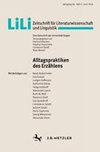Laientheolog*innen als Expert*innen in der frühen Neuzeit
IF 0.1
4区 文学
0 LANGUAGE & LINGUISTICS
LILI-ZEITSCHRIFT FUR LITERATURWISSENSCHAFT UND LINGUISTIK
Pub Date : 2023-11-07
DOI:10.1007/s41244-023-00313-2
引用次数: 0
Abstract
Abstract In the Early Modern period, many professions, including theology, did not yet have systems to validate expertise. Some laypeople were able to acquire deep theological knowledge or have more impact than church-ordained theologians. The Reformation promoted the idea of a »Priesthood of Believers,« but it remained little developed, since clergy continued to administer sacraments. Lay activity surged in the sixteenth and seventeenth centuries under the influence of spiritualists, who believed that all things are connected by the Divine, and thus, that people do not need clergy to access God. Christian theosophers saw nature as divine revelation, and their study of the natural world also began to undermine traditional theology. Since through confessionalization, state and church power were deeply intertwined, the state tried to enforce adherence to confession. The attempts of the early modern state to define who could act as a theologian have left traces in modern historiography.宽恕学一直引神论及年轻时代
在近代早期,许多职业,包括神学,还没有系统来验证专业知识。有些平信徒能够获得深刻的神学知识,或者比教会任命的神学家更有影响力。宗教改革促进了“信徒的祭司”的概念,但由于神职人员继续管理圣礼,它仍然没有得到发展。在唯灵论的影响下,世俗活动在16世纪和17世纪激增。唯灵论认为,所有的事物都是由神联系在一起的,因此,人们不需要神职人员就能接近上帝。基督教神智学者将自然视为神的启示,他们对自然世界的研究也开始破坏传统神学。由于通过告解,国家和教会权力深深地交织在一起,国家试图强制人们遵守告解。早期现代国家界定谁可以作为神学家的尝试,在现代史学中留下了痕迹。
本文章由计算机程序翻译,如有差异,请以英文原文为准。
求助全文
约1分钟内获得全文
求助全文
来源期刊
CiteScore
0.50
自引率
0.00%
发文量
33
期刊介绍:
Zeitschrift für Literaturwissenschaft und Linguistik (LiLi) (“Journal for Literary Studies and Linguistics”) has been offering a programmatic bridge between German linguistics and German literary studies since 1971. All issues are published in alternate editions as topical issues of modern literary studies, medieval studies and linguistics, focusing on media and cultural studies and combining theoretical and historical approaches. The Labor (“Laboratory”) section contains research contributions in German or English language that are independent of the respective thematic issue and contribute to the transitional area between Germanic linguistics, German literary studies, and cultural studies.
LiLi exclusively publishes research content, peer reviewed by external experts. The editors welcome unsolicited proposals for the "Laboratory" section in German or English language.

 求助内容:
求助内容: 应助结果提醒方式:
应助结果提醒方式:


